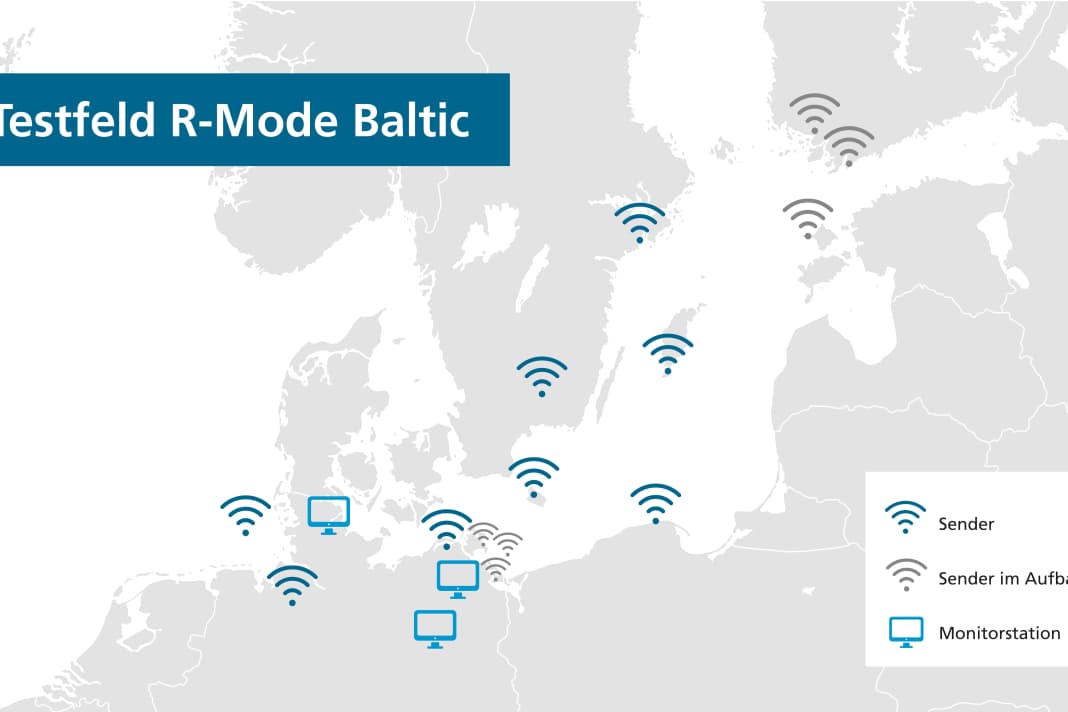Navigation: Satellite-independent backup system for the Baltic Sea enters next phase
Hauke Schmidt
· 26.03.2025




As part of the ORMOBASS project (Operational R-Mode Baltic Sea System to support resilient navigation), the existing test field for the so-called ranging mode system (R-Mode) is being extended to the Baltic Sea region between Sweden, Finland and Estonia. This is in response to the increasing GPS interference in this region. The R-Mode system is intended to serve as a ground-based backup if global systems such as GPS or Galileo fail or are disrupted.
Functionality and infrastructure
R-Mode utilises existing infrastructures of national maritime facilities. Specifically, radio services in the medium wave and ultra-short wave range, such as DGPS reference transmitters, are used to provide the supplementary navigation service. Over the past seven years, a test field with eight R-mode transmitters has been set up, covering around 800 kilometres between Helgoland and Stockholm. The system measures the distance between a ship and various land stations and uses this to calculate its geographical position.
The backup for GPS faults is being expanded
The ORMOBASS project, which was launched in 2023, aims to extend the test area to the Baltic Sea region between Sweden, Finland and Estonia. This region is particularly relevant as GPS interference is currently frequently reported from there. In 2024, scientists analysed the medium-wave radio signal stations there and developed a concept for expanding the test area. The implementation of this concept is planned for 2025 and 2026.
Standardisation and international cooperation
Standardisation is a key step towards the introduction of the R-Mode system. The DGPS and VHF transmitters used are part of the standardised international navigation infrastructure. Any modification or expansion of these systems must be approved by the IMO and IALA shipping and aviation organisations, which is a complex and time-consuming process. DLR was involved in drawing up the necessary IALA guidelines and was also able to draw on experience from Canada and South Korea. IALA Guideline 1187, which serves as the basis for the use of medium-wave R-mode signals, has been available since the beginning of 2025.
Importance for maritime security
Anke Kaysser-Pyzalla emphasises the importance of the project: "This first step towards establishing a maritime backup system in the Baltic Sea region has shown that R-mode technology works in practice as an alternative terrestrial navigation system and makes it possible to position a ship even without satellite-based systems." In view of the GPS disruptions observed since the war of aggression against Ukraine, the technology makes an important contribution to the safety of maritime shipping and the efficiency of the economy.
What happens next
The aim of the ORMOBASS project is to develop all essential functions of the R-mode system for both frequency bands, medium and ultra-short wave, by 2026 and to make them available to the responsible maritime authorities for the operation of the extended test area. In addition to project management, DLR is also responsible for the development of the R-mode receiver technology, system design, system testing and standardisation. The standardised signals should be available in the area between Germany, Finland and Estonia from the beginning of 2026.
Unfortunately, it is still completely unclear when commercial receivers can be expected and to what extent they will be suitable for use on yachts. One obvious solution is likely to be a black box receiver that calculates position data and forwards it to the on-board instruments as an NMEA2000 data set, for example. In this way, existing GPS-based chart plotters could continue to be used if they allow the use of an external position source. The R-mode receiver would then only have to be selected as the position source in the network, which may require a software update.
Technical specifications:
R-Mode system:
- Frequency ranges: Medium wave and ultra short wave
- Number of transmitters in the test field so far: 8
- Extent of the test field to date: around 800 kilometres between Helgoland and Stockholm
- Planned enlargement: Baltic Sea region between Sweden, Finland and Estonia
- Position accuracy: 10 to 60 metres (depending on weather conditions and time of year)

